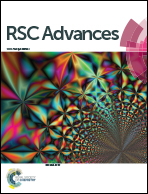Optimization of key factors affecting biohydrogen production from microcrystalline cellulose by the co-culture of Clostridium acetobutylicum X9 + Ethanoigenens harbinense B2
Abstract
The key factors (initial pH value, substrate concentration, incubation time, C/N and L-cysteine concentration) that affect biohydrogen production from microcrystalline cellulose in batch fermentation by the co-culture of isolated strains (Clostridium acetobutylicum X9 + Ethanoigenens harbinense B2) were optimized using an orthogonal experiment. The isolated strain, Clostridium acetobutylicum X9, had high hydrogen yield from microcrystalline cellulose (MCC), and Ethanoigenens harbinense B2 could produce hydrogen efficiently from monosaccharides directly from microcrystalline cellulose. The optimal parameters were as follows: initial pH value of 6.0, 12 g L−1 substrate concentration, 40 h incubation time, 0.7 g L−1 L-cysteine concentration and a 4 : 1 ratio of C/N. Under the optimum culture conditions, a maximum hydrogen yield rate of 10.4 mmol g-MCC−1 was obtained. This yield is approximately 2.2-fold greater than that of mono-culture Clostridium acetobutylicum X9. It suggests that the optimal conditions achieved can be applied to the production of hydrogen from microcrystalline cellulose using the co-culture of isolated strains, Clostridium acetobutylicum X9 + Ethanoigenens harbinense B2.


 Please wait while we load your content...
Please wait while we load your content...